What a week! The last seven days have certainly brought some ups and downs in our research (and our fun, actually) here in Shandong, but Julia and I have been doing our best to take it all in stride.
Last weekend began on a very positive note, as Julia and I both found out we received generous research funding from UC Davis, the result of applications we submitted during spring quarter. It definitely takes the edge off of personal resources committed to this project. :) To celebrate, we took a bus downtown to visit the Tsingtao beer museum and brewery. Tsingtao is by far the most common/popular beer in China; it practically has a monopoly on the beer market. It was established over a hundred years ago, when Qingdao was a German colony. (Tsingtao is actually the same as Qingdao in Chinese – the spelling difference comes from an older romanization, rather than the more modern pinyin.)
The museum wasn’t too difficult to find, as it was appropriately located on “Beer Street”. Signs in both Chinese and English led us through a self-guided tour of Tsingtao’s history and brewing process, which was pretty fun and informative, and included two free samples – one glass of unfiltered beer (which we really liked – very flavorful) and one glass of the final product.
After the museum walked to a nearby sushi place that turned out to be amazing. I’m surprised it’s not all over the China travel guidebooks, because it’s totally the type of place foreigners would love – cute, cozy, friendly staff, great food, and even a picture menu. Its location location makes it easy to miss – we had to walk through a nondescript side street market to get to it. I stumbled upon it just from a baidu search of restaurants in the area, and realized I’d never had sushi in China, so I wanted to check it out. We wound up ordering 4 big plates of sushi that was every bit as good as what I’ve had in the US, and soooo cheap – about $15. Total. Plus we ordered two big bottles of Qingdao, of course. :)
After sushi, we took a bus to Zhongshan park, a large green space near downtown with walking trails and a zoo. We were too late to tour the Buddhist temple we’d heard about, but fortunately not too late to get a ticket for the cable car across the park! (By cable car I mean one of those ski-lift-type rides you see at state fairs and amusement parks.) We ascended just as the sun was setting, and the route was fairly long – probably took about 45 minutes total – so we had great views of the bay and city lights. 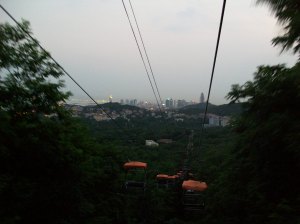
Now, up until this point I had been pretty proud of my ability to navigate the Qingdao bus system, which isn’t too different from that of Hangzhou or Beijing or anywhere else. But the QAU campus is much farther from downtown than the ZJUT (Hangzhou) campus, and I failed to account for this important detail when assuming it would be easy to catch a bus back home on a Saturday night. So as we were happily taking blurry pictures of downtown Qingdao from on high, the last buses to Chengyang district were leaving. Naturally, we didn’t realize this until we had left the park and walked to the bus stop. Even then, we gamely looked up an alternate bus route on Julia’s smart phone, with the hope that there would be another bus we could catch. But that bus had stopped running even earlier, as a friendly middle-aged Chinese guy kindly informed us. At this point Julia and I started thinking we needed to come up with another way to get home, and the guy I had just talked to, plus a couple women hanging out nearby selling drinks, became rather invested in our predicament.
The whole situation was a really great example of two things: 1) If you know a little bit of a language, even just enough to explain your situation in broken phrases and understand the advice given to you, it will make a world of difference in the experience you have in a place. 2) By and large, Chinese people are incredibly patient and willing to help hapless foreigners who clearly don’t know what they’re doing (based on my biased anecdotes, anyway).
Cut to this guy looking very concerned about us, and insisting that he personally lead us on a 20-minute walk to the one bus stop that might be able to get us home at that hour. This was completely out of his way – I was so turned around by the time we actually arrived that I had no idea where we were. We suggested a couple times that it’d probably be simpler for us to get a taxi, but he’d just worriedly shake his head and say, “Oh, it’s so expensive! You are students!” When we found that even our last-hope bus had stopped running, he finally accepted that a taxi was our best option, and hailed us a cab, talking to the driver to make sure he knew how to drive us there. (QAU is about a one hour drive from downtown.) I had to basically dive into the front seat to physically block our friend from giving money to the driver for our fare. Even as we thanked him profusely and said goodbye, he looked worried; I wished later we could have texted to assure him we got home okay.
For the record, the taxi fare was about 90 yuan, or $15 – totally reasonable, especially when split between us. But sometimes it can be difficult to translate what is & isn’t expensive for us. Anyway, at this point you may be imagining that we returned home in the wee hours of the morning, when in fact it was barely 11:00. Such is the fate of would-be partyers living so far from downtown.
On Sunday we thought we would spend a relaxing afternoon wandering along Qingdao’s beachside trails and piers, leaving ourselves plenty of time to catch the bus, in light of the previous day’s lessons. Simple, right? However, barely an hour into our stroll, Julia & I managed to completely lose each other. Usually this would have been quickly resolved with a phone call, but we learned the hard way that Julia’s phone had just run out of minutes (and she had no idea how to buy more). In short, we spent the rest of the afternoon wandering along the coast on our own, trying to predict where the other one would be (often missing each other by a few minutes, as we later calculated), but generally having a pleasant time nonetheless.
Qingdao has a long continuous trail along the bay, linking piers to small parks and beaches; we each walked for a couple miles and saw maybe half of it, so we might return if we have time. We each made our separate way home – me by bus, Julia by a resourceful bus/taxi combo – and arrived home within 45 minutes of each other, to our mutual relief.
Monday brought Yongbo to Qingdao! Yongbo is an undergraduate IAD (International Agricultural Development – the same as the MS program Julia & I are enrolled in) student who’s been assisting our research project for the last few months. He’s provided us with a wealth of insights and proved indispensable for Chinese-English translations, so we were very happy to have him rejoin us. Also, he happens to be a native of Xi’an, so he’ll be even more of an asset when we go to Shaanxi in a couple weeks. To toast his arrival we tried a restaurant near campus that turned out to have no set menu – the waiter tells you what dishes they’re preparing that day, and you choose from these. I’m confident Julia & I could have ordered on our own, but definitely not as smoothly as with Yongbo’s help. We decided on two vegetable dishes -the first garlicky, slightly sweet eggplant, the second spicy roasted cauliflower – and a chicken (complete with head and feet) cooked in a slightly spicy broth and topped with thin, square-shaped noodles. Super delicious.
The next day we took another trip to visit orchards, and were finally able to test out Julia’s survey! We each interviewed two farmers (with students helping translate for Julia and me), for a total of six farmers. It took about an hour, and we certainly obtained some interesting results, but the most important lessons were about what worked well and what didn’t.
As I’ve mentioned, Julia’s research focuses on information communication technologies (e.g., cell phones, television, internet), and how these tools can be best used to deliver agricultural information to farmers. So a lot of her questions focus on asking farmers what channels of communication they use to solve different types of problems. We spent much of the next day revising the survey, streamlining these questions to get to the heart of the matter quickly. But we also developed some ideas for how to best conduct the survey. For example, in some cases it may be helpful to interview two farmers at a time instead of just one. When there are two surveyors (the American grad student and the Chinese translator) this can help correct the power imbalance there would be with just one survey subject. Also, the second farmer is something of a second translator – conferring with the other to make sure they both understand the question. And the farmers have a little time to mull over each question while the other is giving an answer. Of course, there are disadvantages – namely, influencing other farmers’ responses and taking more time. And the methods we use will depend on both circumstance and Julia’s research design. But it’s details like these that I never would have considered before actually trying them out in the field.
My research interests are primarily focused on the needs of women farmers, and while surveys aren’t my method of choice for this project (more on that in another post) some interesting gender-related points did come up in our conversations that day. I learned that often 80-90% of the hired temporary workers in apple orchards (who do labor-intensive pruning, thinning, bagging, and harvesting) are women, while full-time workers are generally men (who do machinery-related tasks, like spraying pesticides and weed-whacking). For temporary work, women are paid less than men (by about 15-20%) because they work shorter hours so they can attend to children and cooking, etc. at home.
As interesting as this visit was, Julia and I had started to become concerned that we weren’t getting enough time with farmers to collect data (spending more time than we would like touring with professors and hobnobbing at nice dinners), and thought the purpose of our stay in Shandong might be getting lost in our communications with our hosts at QAU. We were also becoming a little impatient with the planning of our orchard visits, which left us in the dark for indefinite stretches of time. So, in an effort to make our orchard visits more fruitful (sorrynotsorry) we crafted and email outlining our concerns and providing suggestions for moving forward.
On Thursday we took another short trip to a nearby orchard (primarily managed by a woman, so it was particularly fascinating to me) and collected another survey (again, learning a lot about how it make it more effective). On the ride back to campus, we were finally able to have a discussion addressing the concerns that we’d raised in our email, partly because our QAU colleague was trapped in a vehicle with us for an hour. Unfortunately, we were met with a pretty harsh rebuke. In the interests of keeping this blog tactful and professional, I won’t go into too many of the details here. Basically, in addition to some miscommunications, we were on the receiving end of some complaints that really had more to do with the agreements between two QAU professors than our survey and methods. And the hierarchical and cultural obstacles that inevitably make it difficult for foreigners to have much independence in visiting the Chinese countryside were also an element. Sorry for being vague on that point – ask me about it when I’m stateside. :)
But, in keeping with this week’s theme, our luck quickly changed course again! We appealed to another professor, and soon got approval to spend next week in Qixia visiting orchards from there. (One of our frustrations was wasting time – both ours and professors’ – traveling to and from QAU, when it’s really not necessary for us to be based on-campus.) We’re very excited about this plan; fingers crossed it meets our high expectations!
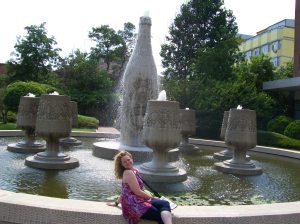
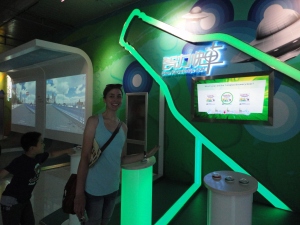
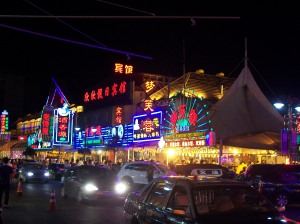
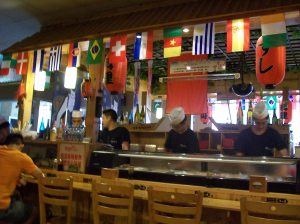

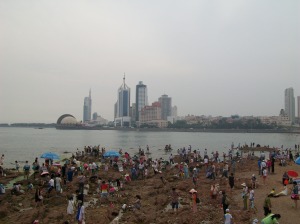
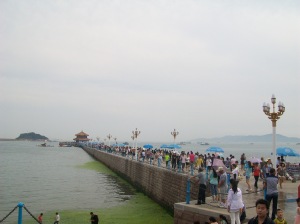
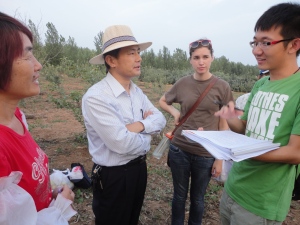
Thanks for the very informative post. Very apt metaphor. Keep up the good work and the sunny attitude!
Enjoy your experiences. It makes me think of nations outside of the states which all of us need to do more. Enjoy your experiences ,they will last you for a lifetime l. Keep up the good work and maybe you could give a talk at church when you get back. Many blessings to you both!
Read and enjoyed. Hope your next few weeks are productive and straight focused. :)
Great stories, Gwen! And wonderful photos. At this moment, thinking about the Sky Glider at the State Fair makes my palms sweaty, so I don’t think I could have gone on your cable car ride.